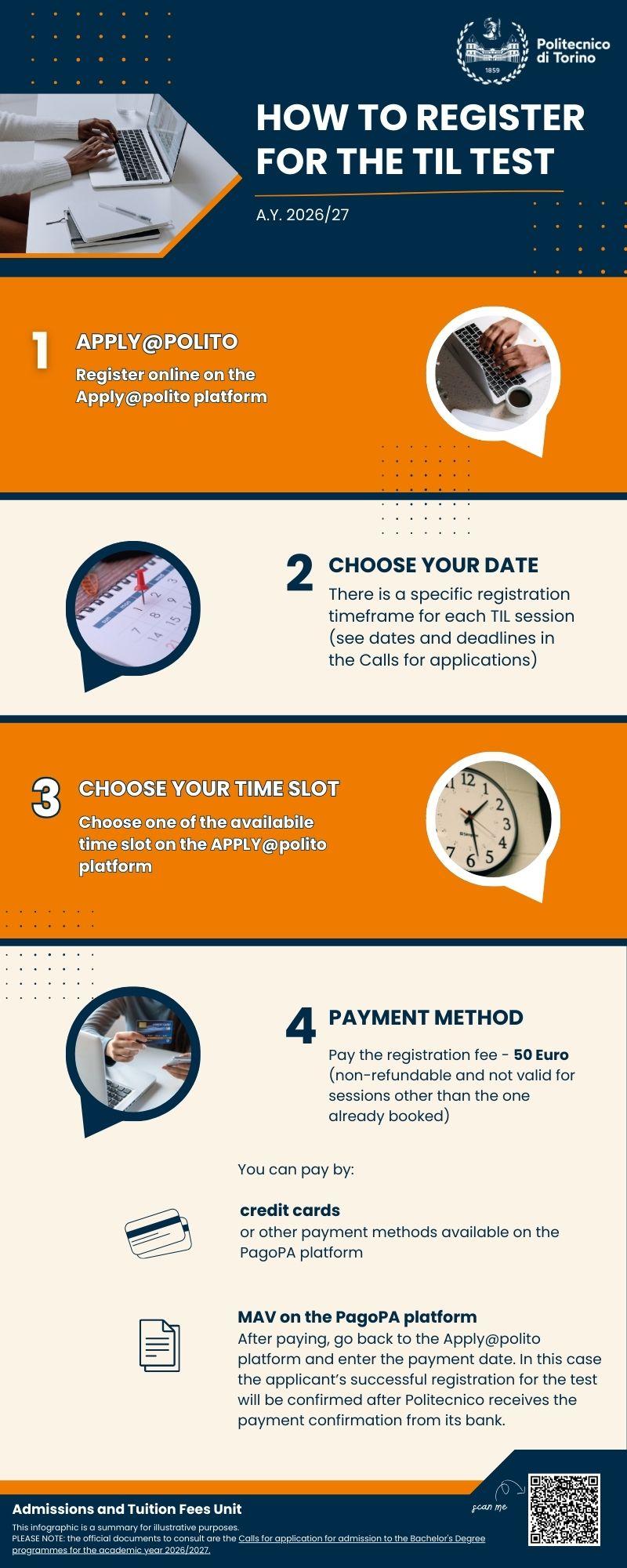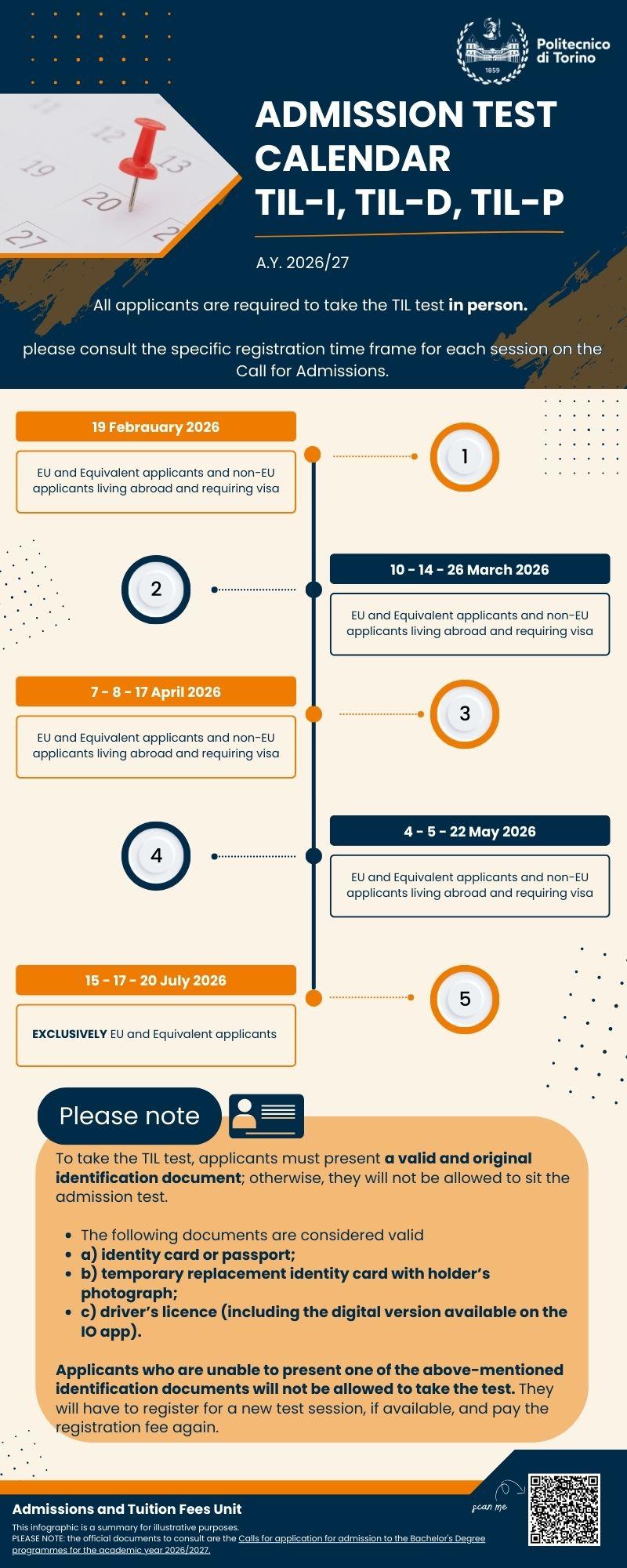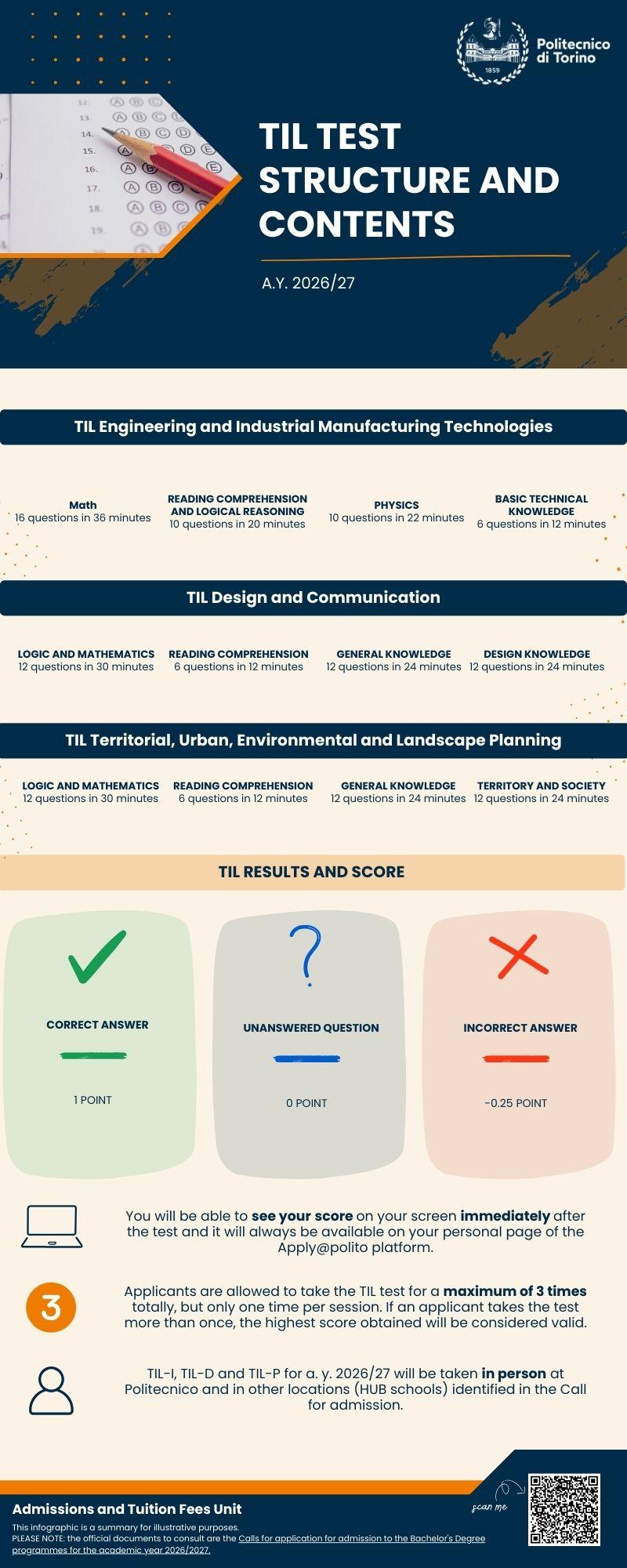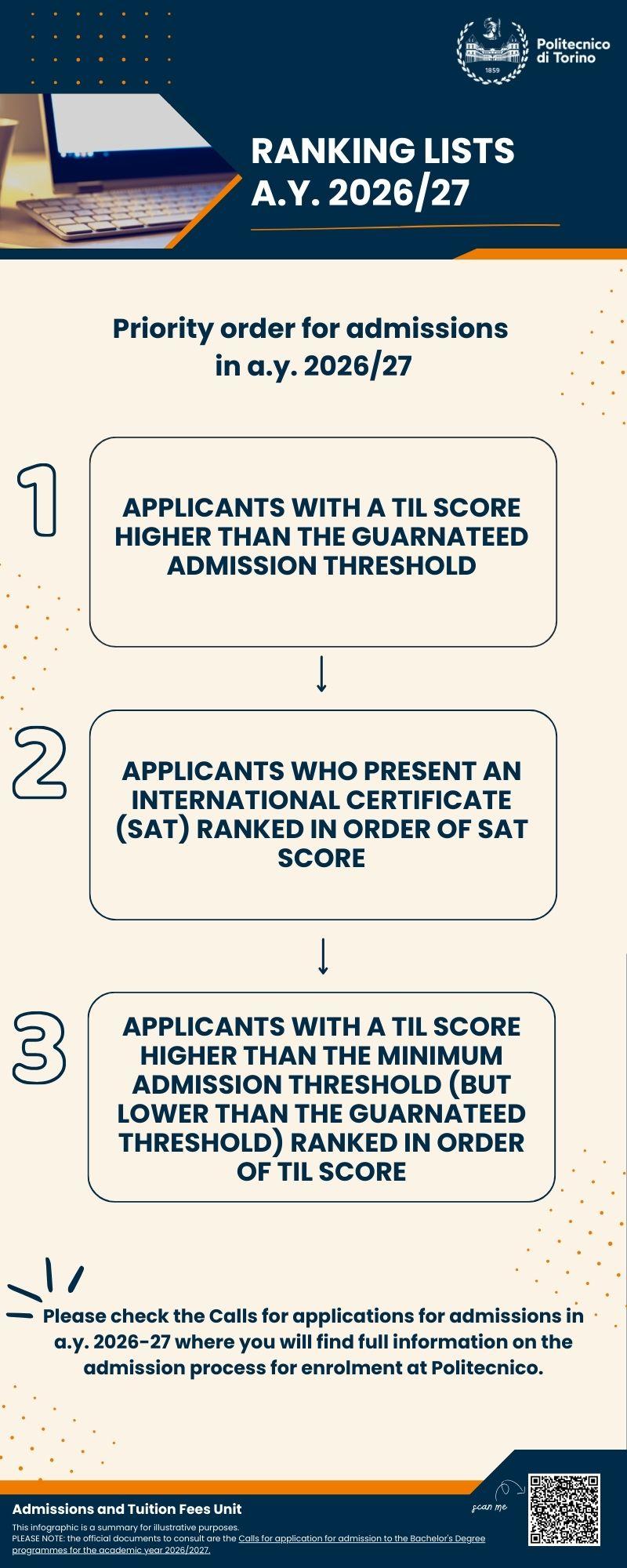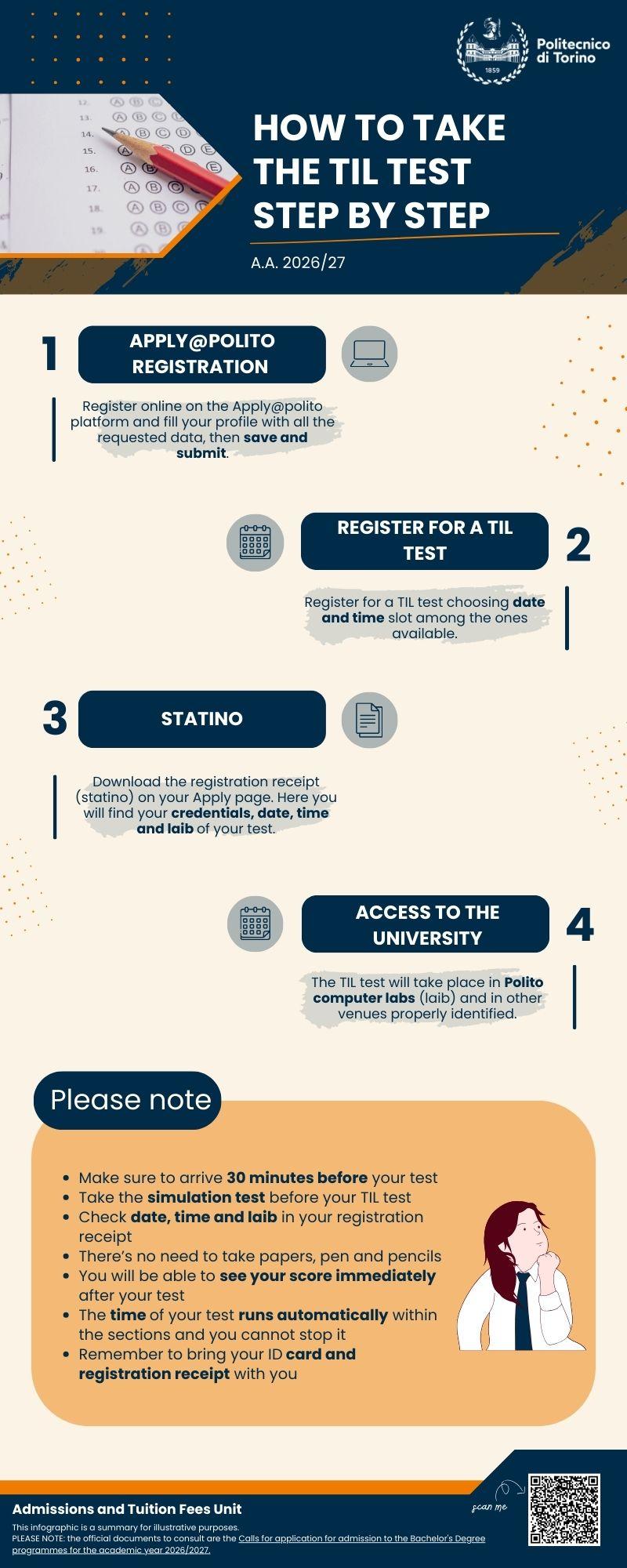In this page you will find the information about the admission test (TIL) that all applicants must take and pass in order to be admitted to a Bachelor’s degree programme.

TIL test calendar - academic year 2026/27
The admission tests (TIL) for the Bachelor's degree programmes of the Engineering area, Industrial Manufacturing Technologies, Design and Communication, Territorial, Urban, Environmental and Landscape Planning will be in person according to the calendar below.
TIL test calendar - in-person test in the computer laboratories of the main campus of Politecnico di Torino (LAIB) and in the Mondovì campus.
| Test Session | Who can register | Test date | Opening of registration |
| 1st Session | EU and equivalent applicants / Non-EU applicants who reside abroad and require a visa | Thursday, 19 February 2026 | Thursday, 22 January 2026 |
| 2nd Session | EU and equivalent applicants / Non-EU applicants who reside abroad and require a visa | Tuesday, 10 March 2026 | Thursday, 22 January 2026 |
| Saturday, 14 March 2026 | |||
| Thursday, 26 March 2026 | |||
| 3rd Session | EU and equivalent applicants / Non-EU applicants who reside abroad and require a visa | Tuesday, 7 April 2026 | Thursday, 22 January 2026 |
| Wednesday, 8 April 2026 | |||
| Friday, 17 April 2026 | |||
| 4th Session | EU and equivalent applicants / Non-EU applicants who reside abroad and require a visa | Monday, 4 May 2026 | Thursday, 22 January 2026 |
| Tuesday, 5 May 2026 | |||
| Friday, 22 May 2026 | |||
| 5th Session | EU and equivalent applicants ONLY | Wednesday, 15 July 2026 | Tuesday, 12 May 2026 |
| Friday, 17 July 2026 | |||
| Monday, 20 July 2026 |
TIL test calendar - UZBEKISTAN HUB
| UZBEKISTAN HUB Tashkent | Who can register | Test date | Test registration time frame |
| TTPU – Turin Polytechnic University in Tashkent | EU and equivalent applicants Non-EU applicants who reside abroad and require a visa | April 9 2026 | From Thursday January 22, 2026, to 2 p.m. Friday April 2, 2026 |
| TTPU – Turin Polytechnic University in Tashkent | EU and equivalent applicants Non-EU applicants who reside abroad and require a visa | May 7 2026 | From Thursday January 22, 2026, to 2 p.m. Thursday April 30, 2026 |
Admission test for Architecture - Academic year 2026/27
The Call for Applications for the Bachelor's degree programme in Architecture-Architecture for academic year 2026/27 will be published based on the guidelines set out in the ministerial decree issued by the MUR, which will establish the procedures for the test, the admission requirements and deadlines.
In order to register for the TIL test, you must register on the Apply@PoliTO platform.
After registering for the admission test, you need to pay the specific registration fee (payment details are published in the Call), respecting the terms and deadlines indicated in the Call for Applications for Admissions.
We remind you that you must necessarily select the programme/s that you are interested in under the “Select your programme” section of the Apply@poliTO platform.
To learn about the prior knowledge that you need to have for the admission test, check the paragraphs below nd the Calls for applications.
In order to get ready for the admission test, on your personal page you will find specific multimedia materials that can help you prepare for the test. A test simulator is also available. All the learning materials as soon as you register on the Apply@polito platform.
Online Interactive Tutoring Course (CIAO!)
On your personal page of the Apply@polito platfom you can find the C.I.A.O. online interactive tutoring course which seeks to help you fill in the gaps in your Math knowledge through specific online tutoring sessions.

Webinars on the admission procedures for a.y. 2026/27
The webinars provide an overview of the test calendar, registration procedures, study materials, admission thresholds, and admission requirements.
The webinars end with a Q&A session for final clarifications.
Upcoming webinars 2026
Below you can find the updated schedule of our upcoming Admission Webinars:
February 5, 2026
3:00 PM (in English, for applicants with a foreign high school diploma)
Webinar in collaboration with the Recruitment Unit
Information available on the web page: Choosing a degree programme
Participation link
February 10, 2026
3:00–4:00 PM (in Italian, for applicants with an Italian high school diploma)
Webinar in collaboration with the Recruitment Unit
Participation link
April 23, 2026
- 1:30–2:30 PM (in English, for applicants with a foreign high school diploma)
- 3:00–4:00 PM (in Italian, for applicants with an Italian high school diploma)
June 2026 (dates to be defined)
Webinars dedicated to the Architecture area and the TIL-A admission test
(times and exact dates will be announced after the publication of the Call for Applications for Admission to the Bachelor's degree programme in Architecture for the 2026/27 academic year)
July 2, 2026
- 1:30–2:30 PM (in English, for applicants with a foreign high school diploma)
- 3:00–4:00 PM (in Italian, for applicants with an Italian high school diploma)
Discover PoliTO - Promotional Webinar
Bachelor's degree programmes
These webinars are designed for prospective students interested in our Bachelor’s degree programmes. They provide an overview of Politecnico di Torino, its course catalogue and student services.
The webinars will be in English.
22 January 2026 – 3:00 PM
Participation link
29 January 2026 – 3:00 PM
Participation link
12 February 2026 – 3:00 PM
Participation link




